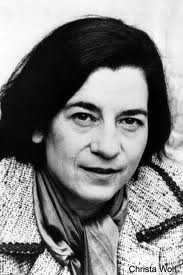Wolfgang Hilbig's brilliant novel "Ich" (1993) deals with a group of "dissident" writers know as "die Szene" in the former East Germany (GDR) who are idolized by critics in the West. It turns out that these brave writers are in fact all in the employ of the Stasi or are Inoffizieller Mitarbeiter (IM – informants) for the Stalinist state.
I couldn't help but think about Hilbig and die Szene when I learned that Christa Wolf had died yesterday in Berlin. Back in the 1970s and 1980s the West celebrated Christa Wolf as the most important figure in "East German Literature" (DDR Literatur). Here was a brave writer who stood up to the state apparatus of her chosen country but who also condemned the West for its moral hypocrisy and capitalist excess. Her important novels Der geteilte Himmel (1963) and Nachdenken über Christa T. (1968) had a moral authority which seemed to be lacking in the decadent literature of West Germany (BRD). We admired this new voice of "subjective authenticity" which was light-years from the dreary socialist realism we associated with the literature sanctioned in the East Bloc.
But Christa Wolf knew exactly how far she could go before crossing the line that would mean the end of her privileged life in East Germany. Never would she give up the nice apartment, the personal meetings with Honecker, the trips to West where she could preside over conferences on DDR Literatur. The collapse of the Berlin Wall in 1989 was a great personal calamity for Christa Wolf, for overnight the genre of DDR Literatur was irrelevant. In desperation she tried to portray herself as a victim in Was bleibt (1990) but shortly thereafter the Stasi archives were opened and the evidence was there for all to see: Christa Wolf was part of "die Szene", and all along the Unrechtsstaat had been using her to legitimize itself.
What remains – was bleibt – of Christa Wolf's reputation will quickly fade, her novels will live on a historical artifacts, devoid of lasting literary value. Those East German writers who will be remembered in future generations will the ones who were expelled (Hilbig) or were silenced (Werner Bräunig, Peter Huchel).
See also my post Der Neger von Adorno.



4 comments
// Those East German writers who will be remembered in future generations will the ones who were expelled (Hilbig) or were silenced (Werner Bräunig, Peter Huchel). //
+
It would be convenient if the judgement of literary artists were to coincide with their politcal stands.
Fortunately, that isn’t the case.
Celine will be read. So may will Christa Wolf [I’m not equipped to judge that]
A revew by Margaret Atwood.
http://www.randomhouse.com/boldtype/0498/wolf/essay.html
Hilbig’s reputation will grow not because of his politics, but because he was a great writer.
If you go back and read Christa Wolf’s key books from the 1960’s there is a moral tendentiousness which prevents them from being great literature. Her whole literary persona was wrapped up in being the “loyal dissident” and so needed the Berlin Wall – that monument to inhumanity – to thrive.
Still, I’m happy to be proven wrong, and intend to reread “Kindheitsmuster” – generally regarded as her best novel.
// Her whole literary persona was wrapped up in being the “loyal dissident” //
Well, OK. My favorable impression isn’t based on a knowledge of her writing, except that I enjoyed “Ein Tag im Jahr”.
Perhaps, also, I react negatively to the criticism that she wasn’t sufficiently heroic to accept & write from a western view of her society, rather being “wrapped up in being a ‘loyal dissident'”
One could say the same of George Orwell, [who also did a bit of reporting to authorities].
David, I’m glad you are going to read more of Christa Wolf’s work. Reading her when I did, in the 80’s, what I thought her work was mostly concerned with was feminism: issues in personal and work life as women experienced them in the former East Germany.
Comments are closed.